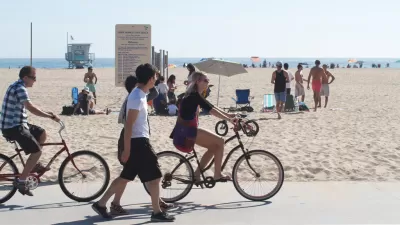The unstoppable force paradox is an exercise in logic that seems to come up in the law all too often. There is a Chinese variant. The Chinese word for “paradox” is literally translated as “spear-shield” coming from a story in a Third Century B.C. philosophy book, Han Fiez, about a man selling a sword he claimed could pierce any shield. He also was trying to sell a shield, which he said could resist any sword. He was asked the obvious question and could give no answer. The Washington Supreme Court broke the paradox between a 12-month moratorium during which the City of Woodinville considered sustainable development regulations for its R-1 residential area, and the efforts by the Northshore United Church of Christ (Northshore Church) to host a movable encampment for homeless people on its R-1 property. City of Woodinville v. Northshore United Church of Christ (July 16, 2009).
The unstoppable force paradox is an exercise in logic that seems to come up in the law all too often. There is a Chinese variant. The Chinese word for "paradox" is literally translated as "spear-shield" coming from a story in a Third Century B.C. philosophy book, Han Fiez, about a man selling a sword he claimed could pierce any shield. He also was trying to sell a shield, which he said could resist any sword. He was asked the obvious question and could give no answer.
The Washington Supreme Court broke the paradox between a 12-month moratorium during which the City of Woodinville considered sustainable development regulations for its R-1 residential area, and the efforts by the Northshore United Church of Christ (Northshore Church) to host a movable encampment for homeless people on its R-1 property. City of Woodinville v. Northshore United Church of Christ (July 16, 2009).
Throw into the mix the Washington State Constitution and the federal Religious Land Use and Institutionalized Persons Act (RLUIPA) and you have enough irresistible forces and immovable objects to fill any Chinese philosopher's book.
The encampment of 60-100 people in the Puget Sound area moves from place to place every 90 days. When it came time for it to move, and Northshore Church applied for a temporary use permit, the city refused to act on it based on the moratorium put in place just a few months before.
Northshore Church sued. The city won at trial and got an injunction against the encampment. The trial court held that the city met its obligation to have a narrowly tailored moratorium that achieved a compelling governmental purpose – thus, there were no constitutional or RLUIPA violations. The appellate court upheld the trial court, even though it found that the trial court should not have applied strict scrutiny.
The Washington Supreme Court reversed, holding that the city could not refuse to process the application because the Washington Constitution guarantees "[a]bsolute freedom of conscience in all matters of religious sentiment, belief and worship [and] shall not be so construed as to justify practices inconsistent with the peace and safety of the state." The refusal to process the application was a substantial burden, said the court, because "[i]t gave the Church no alternatives."
The Court did not reach the RLUIPA claim as it held the constitutional violation was dispositive.
The city's website describes the appellate court decision, but does not report the Supreme Court's reversal. Northshore Church's website, however, celebrates the decision.
The key point is the utter lack of any alternatives. The city simply refused to process the application. Northshore Church said at oral argument that it could have hosted the encampment inside the church (sounds like new evidence to me – surprising how often this kind of thing sneaks in during appellate argument) and the Washington Supreme Court noted this as illustrative of how refusing to process the application precludes considering any alternatives. Almost as important was the moratorium of 12 months and the Washington Supreme Court's precedential decision that a 14-month delay created an unconstitutional burden. The city had not shown the moratorium to be a narrow means of achieving a compelling goal. "Planning pause" moratoria, as we call them, are hard to justify beyond six months and most moratoria should allow some administrative relief for exceptional cases. This is one of those exceptional cases, where the permit was for a temporary use, a use not likely to defeat the purpose of this moratorium to study how to have more sustainable development in a residential zone.

Maui's Vacation Rental Debate Turns Ugly
Verbal attacks, misinformation campaigns and fistfights plague a high-stakes debate to convert thousands of vacation rentals into long-term housing.

Planetizen Federal Action Tracker
A weekly monitor of how Trump’s orders and actions are impacting planners and planning in America.

San Francisco Suspends Traffic Calming Amidst Record Deaths
Citing “a challenging fiscal landscape,” the city will cease the program on the heels of 42 traffic deaths, including 24 pedestrians.

Defunct Pittsburgh Power Plant to Become Residential Tower
A decommissioned steam heat plant will be redeveloped into almost 100 affordable housing units.

Trump Prompts Restructuring of Transportation Research Board in “Unprecedented Overreach”
The TRB has eliminated more than half of its committees including those focused on climate, equity, and cities.

Amtrak Rolls Out New Orleans to Alabama “Mardi Gras” Train
The new service will operate morning and evening departures between Mobile and New Orleans.
Urban Design for Planners 1: Software Tools
This six-course series explores essential urban design concepts using open source software and equips planners with the tools they need to participate fully in the urban design process.
Planning for Universal Design
Learn the tools for implementing Universal Design in planning regulations.
Heyer Gruel & Associates PA
JM Goldson LLC
Custer County Colorado
City of Camden Redevelopment Agency
City of Astoria
Transportation Research & Education Center (TREC) at Portland State University
Jefferson Parish Government
Camden Redevelopment Agency
City of Claremont





























